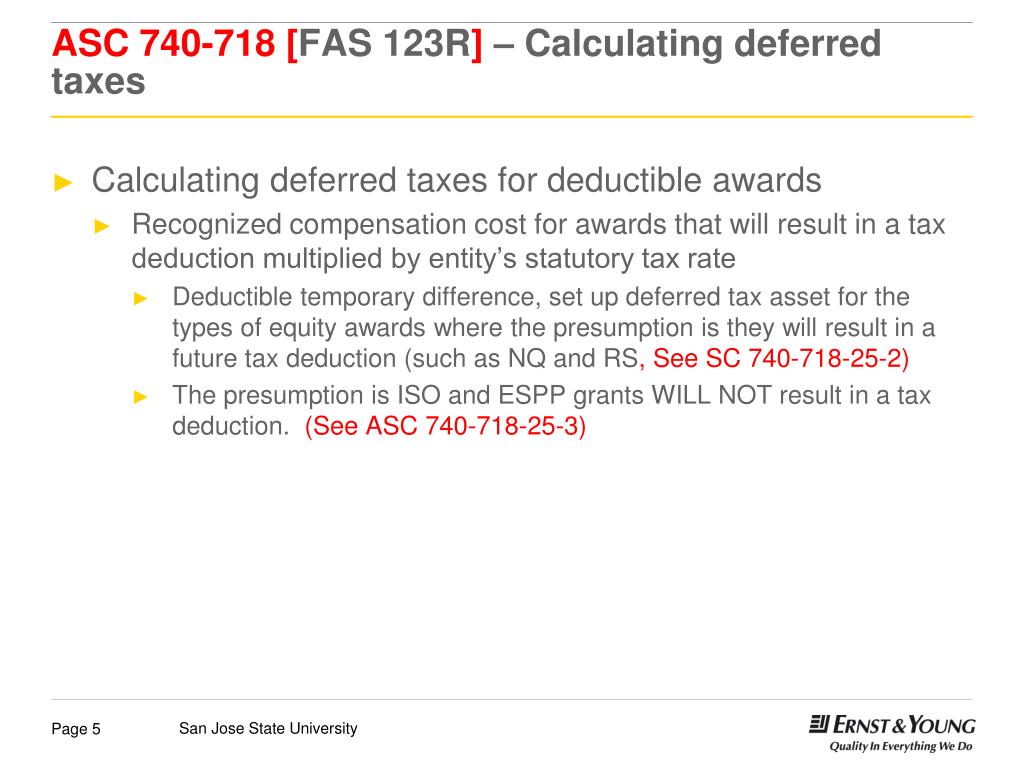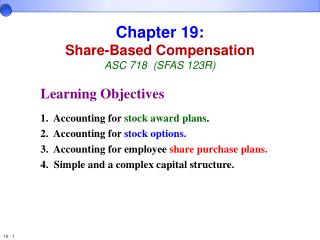Fas 123r accounting for stock options
Lawyers, tax professionals and other executives who are involved with granting equity-based awards to employees should have a basic understanding of the new accounting rules set forth under Statement of Financial Accounting Standards No.
An understanding of the rules is key to assessing their impact on current grants and developing strategies for future grants. The following discussion provides an overview. Before describing the new rules, it helps to understand the old accounting rules. Generally, under the soon-to-be-obsolete old rules, there are two ways to expense stock options: Under fixed intrinsic value accounting, the "spread" of a stock option i.
If the spread is zero, no expense needs to be recognized. This is how companies issue options without expensing them -- by granting the options at fair market value. Certain types of stock options are subject to "variable" intrinsic value accounting. For example, if the option vests based solely on the recipient of the option attaining certain performance goals, the option is subject to variable intrinsic value accounting.
Under variable accounting, any appreciation in the stock underlying the option is generally expensed on a periodic basis for the life of the option i. The effect of variable accounting is that increases in the value of the stock underlying an option can result in dramatic accounting charges to the company's earnings. For this reason, companies generally do not grant stock options or other awards that trigger variable accounting. Finally, under fair value accounting, the fair value of a stock option at the time of grant is expensed over the vesting period of the option.
Fair value is determined by using an option-pricing model such as Black-Scholes. Generally, public companies must comply with FAS R no later than their first fiscal year beginning after June 15, Private companies must comply no later than their first fiscal year beginning after December 15, Thus, any company that operates on a calendar fiscal year must implement FAS R during the first quarter of The first step in applying the new rules is to determine whether an award is an "equity" award or a "liability" award.
An award is an equity award if the terms of the award call for its settlement in stock. Thus, stock options and restricted stock are both equity awards. Stock appreciation rights that are settled in stock are also equity awards. Once an award is determined to be an equity award, the next step is to determine whether the equity award is a "full-value" award or an "appreciation" award.
An example of a full-value equity award is restricted stock. Examples of appreciation awards include stock options and stock appreciation rights. In the case of a full-value equity award granted to an employee, the new accounting rules require a company to recognize a compensation cost based on the market value of the stock underlying the award on the date of grant, less the amount if any paid by the recipient of the award.
In the case of an appreciation equity award granted to an employee, the new accounting rules require a company to recognize a compensation cost equal to the fair value of the award on the date of grant. This cost is also typically amortized over the vesting period of the award. The fair value of an award is determined by using a pricing model. Permissible models include the Black-Scholes model and a lattice model. FASB does not express a preference for a specific pricing model.
Understanding the New Accounting Rules For Stock Options and Other Awards - FindLaw
Regardless of which pricing model is used, the model must include the following inputs: If the terms of a share-based award call for its settlement in cash, rather than in stock, the award is called a liability award. For example, stock appreciation rights that are settled in cash are liability awards. Equity awards may be reclassified as liability awards if there is a pattern of settling the equity award in cash.
The accounting treatment afforded liability awards is much the same as the treatment afforded equity awards, except for one major difference. That difference is that the value of the award is remeasured at the end of each reporting period until the award is settled. In other words, liability awards are subject to variable accounting. Thus, with respect to a full value liability award, compensation cost is based on the market value of the stock underlying the award on the date of grant, less the amount if any paid by the recipient of the award.
This compensation cost is remeasured each reporting period until the award vests or is otherwise settled.
With respect to an appreciation liability award, compensation cost is determined using a pricing model and is remeasured each reporting period until the award is exercised or otherwise settled. The new rules differentiate between awards that vest based on service, performance and market conditions. A service condition relates to an employee performing services for his or her employer. A performance condition relates to the activities or operation of the employer. A market condition relates to the attainment of a specific stock price or some level of intrinsic value.
In the case of an award that vests based on service or performance conditions, the accounting expense is reversed if the award is forfeited. Thus, if an employee terminates before his service-based option vests or if the performance condition set forth in the option is not satisfied, the accounting charge would be reversed. On the other hand, if vesting is subject to a market condition, there is generally no reversal of accounting charges unless the recipient terminates employment before the end of the performance measurement period.
If a company modifies an award, it must recognize as a compensation cost any increase in the fair value of the award on the date of modification over the fair value of the award immediately prior to the modification.
To the extent the award is vested, this compensation cost is recognized on the date of modification. To the extent the award is unvested, this compensation cost is recognized over the remaining vesting period. A "modification" is any change in the terms or conditions of an award, including changes in quantity, exercise price, vesting, transferability or settlement conditions.

Generally, a private company must calculate accounting charges under the new rules as described above. However, there are some important differences for private companies. First, if it is not possible for a private company to estimate its stock's volatility when using an option-pricing model, it generally must use the historical volatility of an appropriate industry index. The index must be disclosed. Under the new rules, a stock option's fair value will be measured on the grant date using an option pricing model and that value will be recognized as a compensation expense over the vesting period.

If the option vests ratably e. If the accrual method is used, each year of the vesting period must be treated as a separate award and the accounting expense is front-loaded.
Thus, the compensation expense for the option may look something like this: Cliff-vested options must use the straight-line method.
Under the old rules, stock options that vest based solely on performance conditions are subject to variable accounting. Under the new rules, such performance-based options are not subject to variable accounting. Instead, the accounting expense of these options is basically measured in the same manner as standard stock options.
In the view of many, performance conditions better align the interests of employees with the interests of company shareholders. Therefore, we will likely see an increase in the granting of performance-based stock options. Under the old rules, SARs are subject to variable accounting. For this reason, not many companies use SARs.
Under the new rules, the accounting expense of a SAR settled in stock is generally measured in the same manner as a stock option and is not subject to variable accounting. Because stock-settled SARs are very similar economically to stock options and companies use fewer shares when settling SARs in contrast to options, companies may move from stock options to stock-settled SARs. SARs also allow participants to acquire shares without having to pay an exercise price or a brokerage commission.
SARs settled in cash, however, are subject to variable accounting. Accordingly, we are not likely to see an increase in the granting of SARs settled in cash. Employee Stock Purchase Plans. Under the old rules, ESPPs are not treated as compensatory and, therefore, no accounting charges are required. Under the new rules, companies that sponsor ESPPs must record an accounting charge unless their ESPP meets certain narrowly drawn criteria, including that the ESPP must not offer a discount of greater than 5 percent and must not incorporate a look-back provision.
Senior Accountant Resume Samples | JobHero
Because most ESPPs do not satisfy this criterion, companies will need to decide whether to amend their ESPPs or take an accounting charge. The accounting charge would be determined using an option-pricing model and accrued over the purchase period. FindLaw For Legal Professionals Not a Legal Professional? Edit Your Profile Log Out. FindLaw Corporate Counsel Business Operations Understanding the New Accounting Rules For Stock Options and Other Awards.
Understanding the New Accounting Rules For Stock Options and Other Awards. Equity Awards The first step in applying the new rules is to determine whether an award is an "equity" award or a "liability" award. Liability Awards If the terms of a share-based award call for its settlement in cash, rather than in stock, the award is called a liability award.

Vesting The new rules differentiate between awards that vest based on service, performance and market conditions. Modifications If a company modifies an award, it must recognize as a compensation cost any increase in the fair value of the award on the date of modification over the fair value of the award immediately prior to the modification.
Summary of Statement No. (revised )
Private Companies Generally, a private company must calculate accounting charges under the new rules as described above. Performance-Based Stock Options Under the old rules, stock options that vest based solely on performance conditions are subject to variable accounting.
Stock Appreciation Rights Under the old rules, SARs are subject to variable accounting. Employee Stock Purchase Plans Under the old rules, ESPPs are not treated as compensatory and, therefore, no accounting charges are required.